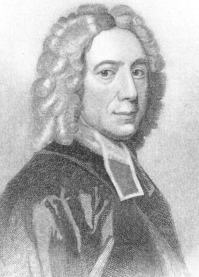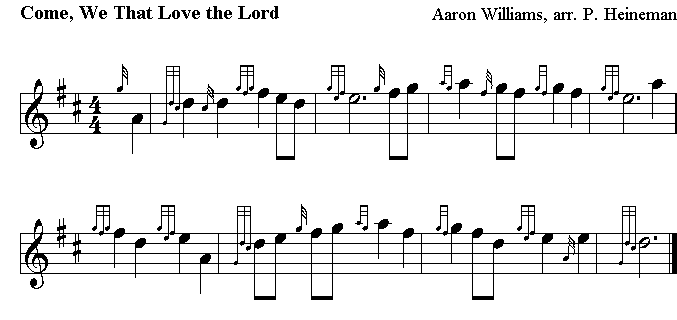
Best viewed in
Internet Explorer
Music (PDF)
Midi
Music (BMW)
Back to

Updated
09/03/2020 |
Come, We
That Love the Lord
|

Isaac Watts |
Isaac
Watts
(July 17, 1674 – November 25, 1748) is recognized as the "Father
of English Hymnody", as he was the first prolific and popular
English hymn writer, credited with some 750 hymns.
Born in Southampton, Watts was brought
up in the home of a committed Nonconformist — his father, also
Isaac Watts, had been incarcerated twice for his controversial
views. At King Edward VI School (where one of the houses is now
named "Watts" in his honor), he learned Latin, Greek and Hebrew.
His education led him to the pastorate of a large Independent
Chapel in London, and he also found himself in the position of
helping trainee preachers, despite poor health. Taking work as a
private tutor, he lived with the nonconformist Hartopp family at
Fleetwood House, Abney Park in Stoke Newington, and later in the
household of Sir Thomas and Lady Mary Abney at Theobalds,
Cheshunt, in Hertfordshire, and at their second residence, Abney
House, Stoke Newington.
Though a
nonconformist, Sir Thomas practiced occasional conformity to the
Church of England as necessitated by his being Lord Mayor of
London 1700–01. Likewise Isaac Watts held religious opinions
that were more nondenominational or ecumenical than was at that
time common for a nonconformist; having a greater interest in
promoting education and scholarship, than preaching for any
particular ministry. |
On the death of Sir Thomas Abney, Watts moved permanently with widow,
Lady Mary Abney, and her remaining daughter, to their second home, Abney
House, at Abney Park in Stoke Newington - a property that Mary had
inherited from her brother along with title to the Manor itself. The
beautiful grounds at Abney Park, which became Watts' permanent home from
1736 to 1748, led down to an island heronry in the Hackney Brook where
Watts sought inspiration for the many books and hymns written during
these two decades. He died there in Stoke Newington and was buried in
Bunhill Fields, having left behind him a massive legacy, not only of
hymns, but also of treatises, educational works, essays and the like.
His work was influential amongst independents and early religious
revivalists in his circle, amongst whom was Philip Doddridge who
dedicated his best known work to Watts. On his death, Isaac Watts'
papers were given to Yale University; an institution with which he was
connected due to its being founded predominantly by fellow Independents
(Congregationalists).

Lyrics by Isaac Watts
|
|
Come, we
that love the Lord,
and let our joys be known;
join in a song with sweet accord,
and thus surround the throne.
Let those
refuse to sing
who never knew our God;
but children of the heavenly King
may speak their joys abroad. |
The hill of
Zion yields
a thousand sacred sweets
before we reach the heavenly fields,
or walk the golden streets.
Then let
our songs abound,
and every tear be dry;
we're marching through Emmanuel's ground,
to fairer worlds on high. |
|



